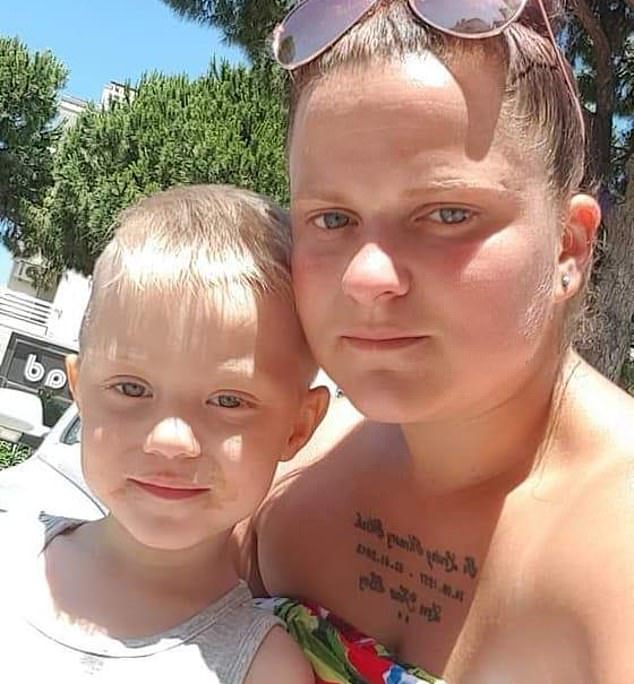A boy of four died from sepsis after hospital doctors sent him home only minutes before test results confirmed he had a potentially deadly infection, an inquest heard yesterday.
Sheldon Farnell’s condition appeared to be improving and he was discharged – even though it was still unclear what had made him so ill and his mother had begged doctors to give her son antibiotics.
On returning home, Sheldon took a turn for the worse and begged his mother not to let him die.
Meanwhile, hospital staff were trying to phone the family to let them know the results had shown the boy needed urgent treatment – but an admin error meant the contact details were taken from the wrong person.
By the time Sheldon was rushed back to hospital early the next morning, he could not be saved. A post-mortem examination found he died of ‘overwhelming sepsis’ that resulted from an ear infection.
An inquest heard yesterday that Sheldon Farnell, four, (pictured with mother Katrina Keegan) died from sepsis after hospital doctors sent him home only minutes before test results confirmed he had a potentially deadly infection
In an emotional statement read to an inquest, his mother Katrina Farnell, 25, said: ‘On the last day of his far too short life my son begged me not to let him die.
‘No four-year-old should even know about death. My baby boy knew he was facing it.
‘We begged for help. “Just try antibiotics, please,” we said, “He’s ill, look at him”.
‘They said “no”, we are supposed to put our trust in doctors so we naively did and now my only son is dead.
‘They let my Sheldon die. My heart is broken, there is a massive hole in my life that will never be filled.’
Coroner Derek Winter told an inquest jury in Durham that Sheldon was first taken to Sunderland Royal Hospital by his mother at 10.20pm on Friday, November 23, 2018, following two days of headaches and high temperatures.

Sheldon (pictured) took a turn for the worse and begged his mother not to let him die while hospital staff were trying to phone the family
His case was dealt with as ‘urgent’ and consultant paediatrician Dr Geoffrey Lawson told the jury that sepsis and treatment with antibiotics was considered but not acted upon.
The next day the boy’s temperature and pulse had come down.
At 8.45pm the interim result of a blood test indicated a streptococcus infection – which can lead to sepsis – but the doctor in charge that night decided this was a ‘contaminant’ or false result due to the boy’s improvement, the inquest was told.
Dr Lawson agreed and sent Sheldon home at 1pm on Sunday – about 15 minutes before the final blood tests came through and confirmed a genuine infection that needed treatment with antibiotics.
Dr Lawson told the inquest that in retrospect he didn’t appreciate the seriousness of Sheldon’s illness, ‘which will be my lifelong regret’.
When staff were unable to contact Miss Farnell to tell her to pick up antibiotics for Sheldon, Dr Lawson decided against getting police to visit the family to inform them as he believed they would return to hospital if the boy deteriorated.
Sheldon was rushed back to hospital at 4am on Monday, November 26, by which time he was in ‘septic shock’.
He was admitted to intensive care but died hours later. Dr Lawson told the inquest Sheldon’s case was ‘very unusual’ because there had been a long delay in the development of septicaemia.

Sheldon was first taken to Sunderland Royal Hospital (stock picture) by his mother at 10.20pm on Friday, November 23, 2018, following two days of headaches and high temperatures
He told the jury that ‘clearly in retrospect it would have been better if I kept him in hospital until I actually knew the result’ of the blood test that confirmed the need for antibiotics.
Dr Lawson, who retired in 2019 after 42 years with the NHS, said he had just been to a conference about improving standards of care and one lesson was that doctors should ignore parents’ concerns at their peril.
But he also said Miss Farnell did not respond negatively to his view that her son should go home.
The Mail launched the End the Sepsis Scandal campaign in 2016 to raise awareness of symptoms. Known as the ‘silent killer’, it occurs when the body overreacts to an infection.
The inquest continues.
